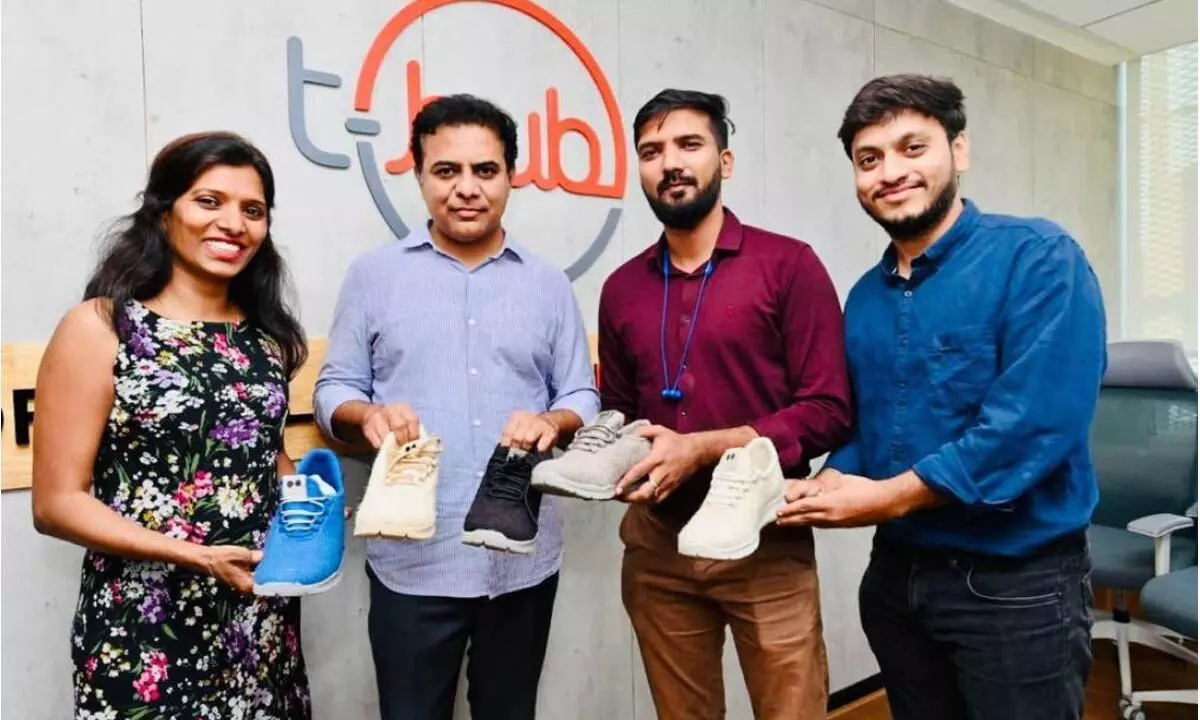Live
- BJP, JD(S) leaders helped win Channapatna bypoll
- INS Kuthar makes maiden visit to Gopalpur Port
- PM praises city-based NGO for promoting libraries
- Odisha police rescue ‘trafficked’ Bangla girl
- iPhone 16 Plus Now at Rs. 2,000 Discount on Amazon – Get It Today
- How Technology is Shaping Global Connectivity and Enhancing Security
- Dy CM directs officials to collect all critical info on caste census
- Naga Chaitanya Opens Up About His Wedding Plans with Sobhita Dhulipala
- ‘NC24’ First Look Poster: Naga Chaitanya’s Next Promises Thrills and Mythology
- Rumors Heat Up as Vijay and Rashmika Enjoy a Cozy Meal Together
Just In
Hyderabad: Low-cost woollen shoes set to turn into a boon for farmers


Low-cost woollen shoes set to turn into a boon for farmers
A significant portion of the rural population, particularly farmers, prefer going barefoot, resulting in a high incidence of injuries and diseases.
Hyderabad: A significant portion of the rural population, particularly farmers, prefer going barefoot, resulting in a high incidence of injuries and diseases. Surprisingly, around 1.5 billion people globally suffer from barefoot-related ailments. Despite the common belief that barefoot walking is beneficial for health, the current soil compositions and terrain conditions in rural India are unsuitable for this practice.
Additionally, farmers typically go through 7-8 pairs of footwear annually, spending approximately Rs. 800-1200, but these shoes are not designed for their working conditions. This leads to a considerable amount of waste, with an estimated 350 million pairs of footwear discarded each year, and a staggering 98 percent of them ending up in landfills.
In an innovative initiative, Hyderabad-based start-up Earthen Tunes Design has introduced a unique solution to address the footwear challenges for farmers in India. They have developed woollen shoes that are meticulously designed to suit Indian conditions. What sets these shoes apart is their use of ethically sourced indigenous wool, obtained directly from skilled artisans, making it a truly innovative and sustainable approach.
These versatile shoes are designed to be suitable for year-round usage, including summer, winter, and rainy conditions. They are not limited to farm use but can be worn both on and off the farm. One of their key features is the ability to be worn without socks while keeping the feet sweat-free and odor-free.
The shoe’s rugged molded makes it particularly well-suited for farm conditions, providing durability and resilience. To ensure the quality and performance of the shoe, field trials have been conducted with farmers in rural Maharashtra. Further, the shoe has undergone laboratory testing at the prestigious Central Leather Research Institute (CLRI), following the SATRA standards, guaranteeing its adherence to rigorous quality and safety benchmarks. Speaking to The Hans India, one of the team members, Santosh Kocherlakota said, “In 2018, three of us came together to start earthen tunes. With the support of the RTBI (IIT Madras Incubation Cell), we secured an initial seed grant of Rs 10 lakhs. Additionally, we have successfully raised an additional Rs 50 lakhs in debt funding from IIT itself. These funds have been instrumental in scaling up production, as well as supporting further research and development efforts.”
In 2019, Earthen Tunes conducted initial pilot testing of their shoes with around 30 farmers in rural Maharashtra. Encouraged by the positive response, we proceeded with the first production run of 1000 shoes. For this production, we directly procured approximately 270 blankets from weavers in Karnataka, Telangana, and Uttarakhand. Through this, we were able to provide employment opportunities equivalent to approximately 3000 hours for the weavers involved, he added.
This initiative has already made a significant impact on the lives of 1000 farmers who have benefited from the use of these shoes. However, considering the potential challenge of ensuring a consistent supply of gongadis (woollen blankets) in the future, Earthen Tunes is actively negotiating with the Telangana State government to seek support in the sourcing of gongadis.
The ancient craft of weaving woollen blankets from indigenous wool in India is facing a critical threat of extinction. The declining demand for woollen blankets in recent years, coupled with the shift towards rearing meat-based sheep instead of the indigenous breed, has led to a significant decrease in the number of active weavers. This alarming trend poses a serious risk to the preservation of this traditional craft and the cultural heritage associated with it. Urgent measures are necessary to revive and sustain the art of weaving woollen blankets and support the skilled artisans involved in this craft.

© 2024 Hyderabad Media House Limited/The Hans India. All rights reserved. Powered by hocalwire.com






